Why it’s time to rethink what it means to be a tourist
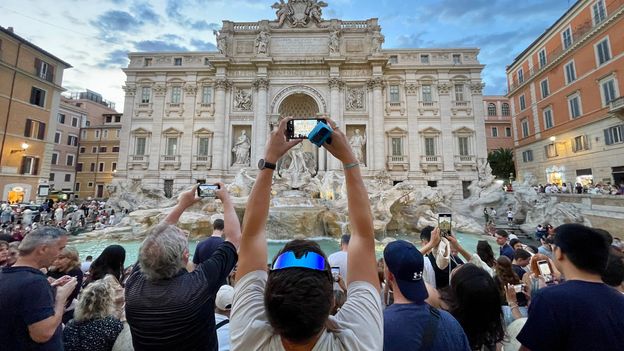
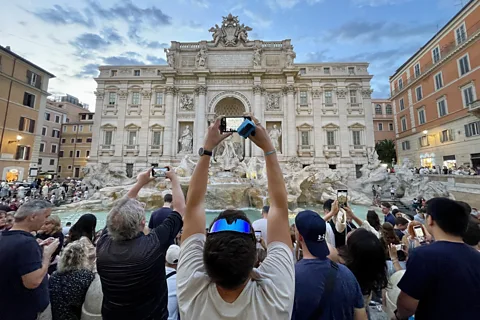 Kathleen Rellihan
Kathleen RellihanA new book chronicles the power that travel has to transform places around the world, for better or worse – and asks us to consider that the label “tourist” can be a good one.
“There are so many tourists here,” I scoff to my Italian American friend who lives in Rome as we squeeze past throngs of them a few streets beyond the Spanish Steps on a sticky night in June. This refrain, admittedly, I’ve repeated more than a few times while travelling.
For the last 20 years, I’ve identified as a traveller. Maybe many of you reading this also identify this way. “Be a traveller, not a tourist” was Anthony Bourdain’s manifesto on his No Reservations TV show when it premiered nearly 20 years ago and tourists have seemed terribly uncool ever since, with their proclivity to search for the comforts of home, their tendency to travel in large numbers and their ability to annoy everyone simply by posing for a photo.
An American journalist living in France, McClanahan chronicles the ever-swaying pendulum of power travel has to transform places around the world – for better or worse. From the controversy (and opportunity) of last-chance tourism amidst our climate crisis, to how social media can both amplify diverse voices as well as fuel superficial skims of complicated places, she notes that tourism has the power to bring countries out of economic disaster (hello, Iceland) but too much of it can drive its very appeal to devastation as its nature and local residents are overburdened.
“Does tourism build up our world or tear it apart? The only answer to both of these questions is ‘Yes’,” writes McClanahan in The New Tourist.
In the midst of another heated travel season, I chatted with McClanahan about the issues her new book tackles – from climate change to overtourism to social media overexposure – and why we need to shift how we view tourism, and tourists, now more than ever.
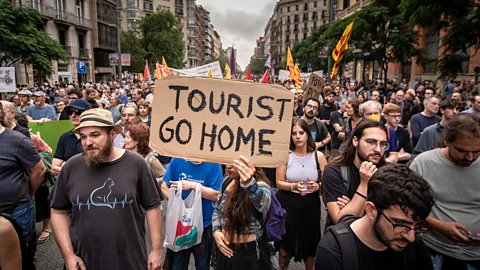 Getty Images
Getty ImagesIn your book’s introduction you nailed it: many of us are uncomfortable with being labelled a tourist as it’s often associated with narrow-mindedness and clichéd, mass-market experiences. Yet you remind us that we are all tourists when we venture away from home. Why do you think it’s important we accept this label?
There’s so much stigma around the word “tourist” or around the idea of tourism, and I don’t think it’s helpful at all. When we think the tourists are over there and I’m over here, that distance doesn’t invite any sort of self-reflection. It’s way too easy to point the finger at those people “over there” who are causing the problems that we read about in the headlines. Whereas if we actually incorporate this identity of the tourist, to some extent, into our own identities, then we implicate ourselves, right?
We are tourists, and I hope the book will give people an appreciation for what a powerful and important phenomenon tourism is. It’s not something that we should look down our noses at – tourism is important. And like any powerful force it can do a lot of good. And it can do a lot of bad. So if we acknowledge the fact that we’re part of this huge force, then suddenly we get our power back and we become agents of change within that force of tourism.
If we think, no, I’m a traveller, and those people are tourists, then nothing is going to change in tourism because no one will feel implicated. We need to elevate our expectations of what it means to be a tourist. And in doing so, we can actually change the way this phenomenon works and the impact it has in the world.
You tackle last-chance tourism in one of your chapters and argue the managers of last-chance tourist sites, such as the Mer de Glace glacier in the French Alps, bear a responsibility to educate their captive audience. Tourists are ramping up their carbon emissions traveling to see these disappearing places threatened by climate change, but you suggest there’s an opportunity to make these experiences more meaningful. How so?
Researchers on this topic of last-chance tourism are digging into visitors’ intentions to change their behaviour after they visit these sites. While researching that chapter, I saw some early evidence that a visit to a disappearing glacier, if it’s done under the right conditions, can inspire people to at least say (in a survey) that they want to be more environmentally friendly in their everyday actions and choices in the future.
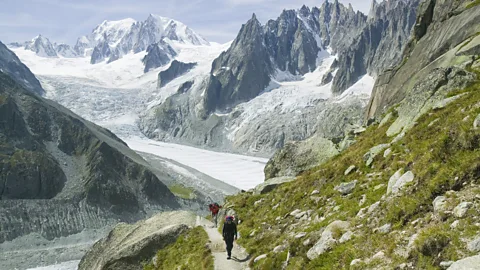 Getty Images
Getty ImagesThe important thing is, it’s all in the how. If you’re having a quick, drive-by visit of a glacier, that’s probably not going to have much of an impact. The way to maximise the chance that you’re going to have an impact on the visitor’s perspective and ultimately their behaviour is if there’s two things happening: education, and an emotional connection of feeling implicated.
There’s a big onus on the tourism operators to do their best to set up an experience that will lead to these kinds of things. And it’s on us as tourists to educate ourselves and to spend some time in the place, not just coming to take a photo and leave. Then you might feel some sense of protection or link to the land that might inspire you in the future, long after you actually leave the place physically.
Another complicated topic you wrestle with is social media’s effect on tourism. You suggest we all bear a responsibility to be more thoughtful when it comes to posting about a place. What power do you think social media has on travel?
I’m certainly not the first person to make the case that social media is the modern form of travel writing. If we look at travel writing over the last 100 years or so, it has been the domain of the wealthy, very privileged white male, with some very important exceptions. Now we have the power to become the narrator of our own adventures. We all have the power to tell our own stories.
That’s a way that social media has positively influenced travel – it has exploded the diversity of voices contributing to storytelling in travel. The biggest challenge is on us to use this powerful tool with care and thought, and a sense of responsibility. And that comes for both those of us who mainly consume content on social media, as well as those of us who create it. And even those of us who don’t have many followers on social media, we still have a huge amount of influence on our friends and family members who might follow us. For anyone who shares on social media, we all have a responsibility to be thoughtful storytellers. Are you depicting an honest representation of the reality as you experienced? Are you sharing nuanced content that’s helping your viewers or readers or followers gain a greater depth of understanding about the place?
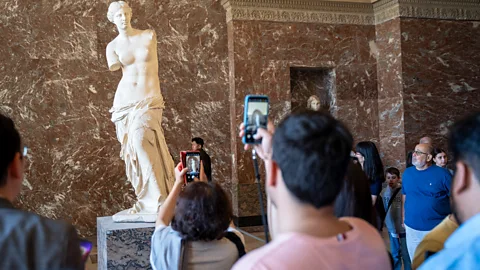 Getty Images
Getty ImagesYou argue in The New Tourist that it’s easy to blame travellers for overtourism – but governments need to manage tourism as well as educate travellers to help them make better choices. Who then is to blame for cities and tourist sites being overrun with badly behaving visitors?
It’s really easy to blame tourists. ‘Oh, my God, all of these tourists’, because they aren’t us. When we talk about tourists, it’s always them. This is why we need to shift our understanding of that word.
We’re all responsible for our own behaviour when we’re travelling. But it’s a much more nuanced point that in a lot of these places that are struggling with the challenges posed by tourism, the government worked hard and spent a lot of money to set up the situation that led to those problems.
For instance, Barcelona went really hard pushing tourism from the lead up to the Summer Olympics in 1982 all the way to 2015 with the election of Ada Colau as the city’s mayor. In Europe in the ’80s, Barcelona was a fading industrial port city. That changed with the Olympics; the government of Barcelona very explicitly made a big marketing push to make sure that it would not fall off the map after the Games.
So then what happens? We start seeing anti-tourism protests and graffiti in Barcelona… a tourist bus gets vandalised. Barcelona pushed hard to promote tourism and did very little to regulate this industry and to protect its residents from the downsides.
Amsterdam is similar. It was pushing hard on its tourism marketing after the financial crash of 2008. They started marketing to tourists, including a video that I describe in the penultimate chapter of the book, “Come and have a messy night out here.” Then years later they’re coming up with a complete antithesis to that marketing campaign. Governments have accountability here – the city leaders always need to remember who elected them and prioritise the needs of their residents.
And we have a responsibility to educate ourselves and make informed decisions with this huge privilege of being able to travel.
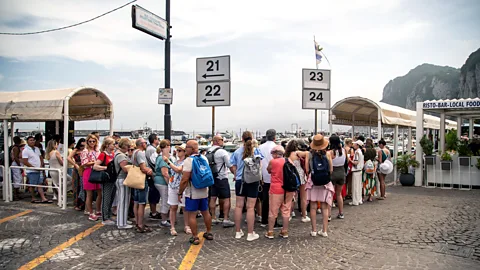 Getty Images
Getty ImagesIf we think about the challenges that our species will face in the years and decades to come – the big ones like catastrophic climate change, possibly a pandemic even worse than Covid, global thermonuclear war, runaway AI – every single one of these crises is completely blind to the idea of a national border, like Covid was.
So there never has never been a moment where it’s more important for each of us to be able to empathise with people whose backgrounds are entirely different from our own. To solve the challenges of the future we will need to learn how to work with people who pray to a different god, who speak a different language, who live on the other side of that border.
It’s never been more important for us to be able to communicate across cultures than it is right now. And tourism is the world’s biggest mover of human beings – 1.5 billion international tourist arrivals in 2024. If each of those 1.5 billion people saw themselves as a citizen, a diplomat who’s going out into the world, which is how I think of the new tourist – someone who realises they’re an ambassador for their country and comes looking to make authentic human connections with people who live in the place, not to just consume and tick a box. Who don’t see themselves as superior to the people, or the place they’re visiting, who can come away from that experience with a degree of scepticism for their home country that might not ever have occurred to them had they never left home. This is the power of travel.
And this is what gives me hope.
—
This interview has been lightly edited and condensed for clarity.
Related
Canada says too little, too late as Trump flip-flops on…
Nadine Yousif and Ali Abbas AhmadiBBC News, TorontoWatch: Canadian liquor store clears out US alcohol in response to tariffsNot long after the US imposed their
Vietnam, Thailand, and Philippines Among Top Asian Destinations Most-Searched by…
Home » Philippines Travel News » Vietnam, Thailand, and Philippines Among Top Asian Destinations Most-Searched by American Travelers, Driven by Surge in Viet
Trump tariffs tarnish ties: Americans anxious about travel to Canada…
Will Trump's tariffs on Canadian goods entering the U.S. affect tourism at home, tarnishing ties Canadians and Americans have shared for decades? It's a fair qu
Looming Trump travel ban strikes fear in Afghans who worked…
Expectations that President Donald Trump will soon bar Afghans and Pakistanis from entering the United States has set off panic among Afghans who were promised












